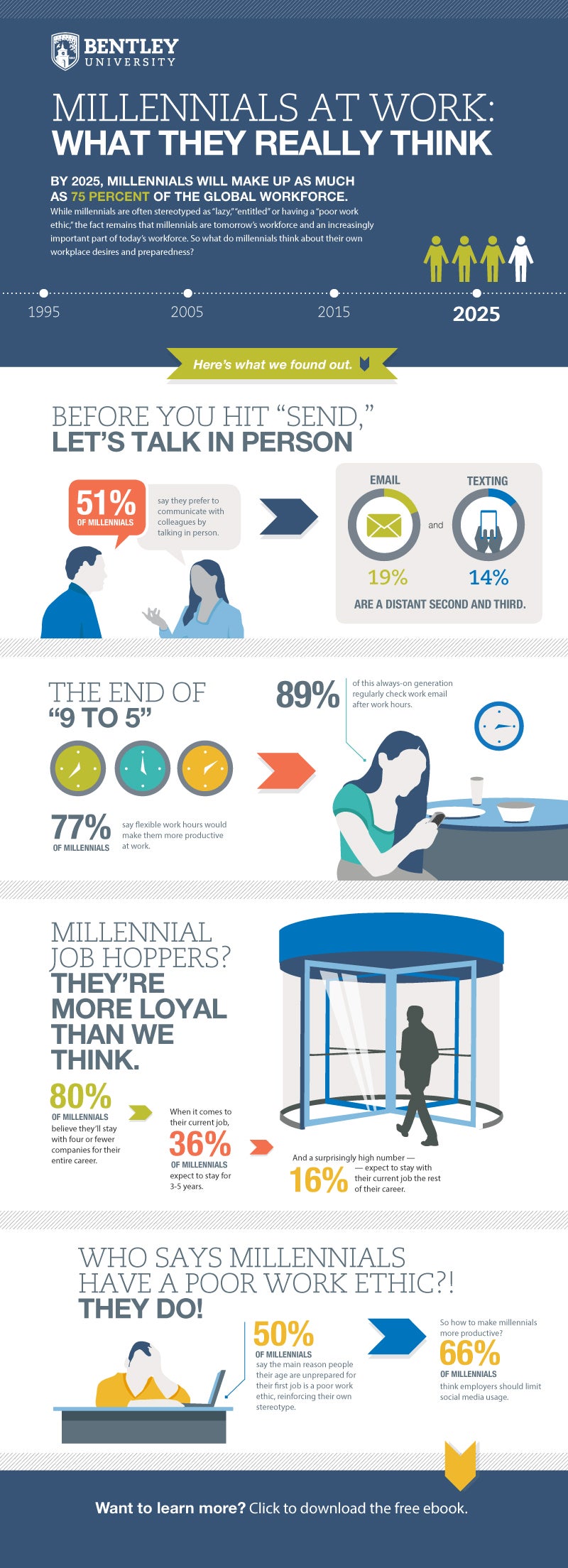How a Focus on the Triple Bottom Line Is Captivating Young Workers (Infographic) Prioritizing people, the planet and profit is crucial for many millennials.
By Gloria Larson Edited by Dan Bova
Opinions expressed by Entrepreneur contributors are their own.
Millennials have been called the "me" generation, accused of being a little too focused on themselves. But is that really true?
As a former lawyer, business leader and now president of Bentley University for the past seven years, I can say that based on my personal experience, this stereotype couldn't be further from the truth.
I've found many members of this generation to not only have the interest but also the capacity to change the world, in their caring about the bottom line of a company, their community and the environment. I refer to this as "triple bottom-line thinking" -- a focus on people, the planet and profit.
Related: What Young People Want From Work
1. People.
Many millennials grew up playing team sports and doing volunteer work, with civic and community engagement integrated into their lives. At the same time, through access to technology, many millennials have become globally aware, connected to real-world issues (like the 2008 presidential election and the Arab Spring) and clear about what they want for their lives, careers and the world they live in.
In the same way, when it comes to their jobs, many millennials aren't content to just accept the status quo but crave a serious work-life balance.
My colleague Leslie Doolittle, assistant dean and director of academic support services at Bentley, has found that many millennials consider central to their lives the following priorities: family, friends and making a difference in their community.
So it's no surprise to see that, according to a Pew Research study earlier this year, 21 percent of the respondents 18 to 29 years old said helping others in need is one of the most important things in their life. Alexandra Levit, a millennial expert, author and ambassador for Bentley's PreparedU Project, says millennials want to be able to serve society in a way that resonates with them personally and in a manner that they find most effective.
Related: Engage Employees When Launching a Workplace Environmental Program
2. Planet.
Many millennials are also searching for ways to make the planet a better place for future generations.
In a study released in November by Bentley University, 95 percent of the millennials surveyed said a company's ethics are very important to them and 22 percent of the respondents said they cared the most about a company's policies toward the environment.
Some suggest that millennials' concern for the planet isn't so unique, when hippies and tree huggers of past generations are considered. Nonetheless, many companies have taken note and established environmentally friendly practices to appeal to employees in this generation, setting up internal recycling programs, volunteer hours for neighborhood cleanups and commitments to reducing greenhouse gas emissions.
Related: This Is How Millennials View Work (Infographic)
3. Profit.
Many millennials want to do well by doing good. According to Bentley's recent survey, while the vast majority of millennials surveyed found a company's ethics to be very important, 79 percent said they expected a salary increase every year and 77 percent said they value a pay raise over a promotion.
At first glance, these desires seem to conflict, don't they?
But many millennials don't see a conflict between doing what's right and earning a good paycheck.
My colleague Susan Adams, a management professor at Bentley, points out that millennials have grown up in tumultuous times, including the terrorist attacks on Sept. 11, 2001, and Great Recession of 2008. They have watched their parents live through uncertainty and learned the importance of financial security. And for some millennials, an ethical company not only takes care of its surrounding community and the planet but also employees by providing adequate financial compensation and benefits.
As a result, many millennials are choosing to create their own opportunities and become entrepreneurs. They see starting their own businesses as a way to fulfill their commitment to the triple bottom line.
I'm extremely optimistic about millennials -- members of a generation that will make up 75 percent of the workforce by 2025. The world is changing amid huge technological and cultural shifts. I'm thrilled that millennials will soon be leading the way into that new world. Below view an infographic based on Bentley University's research.











